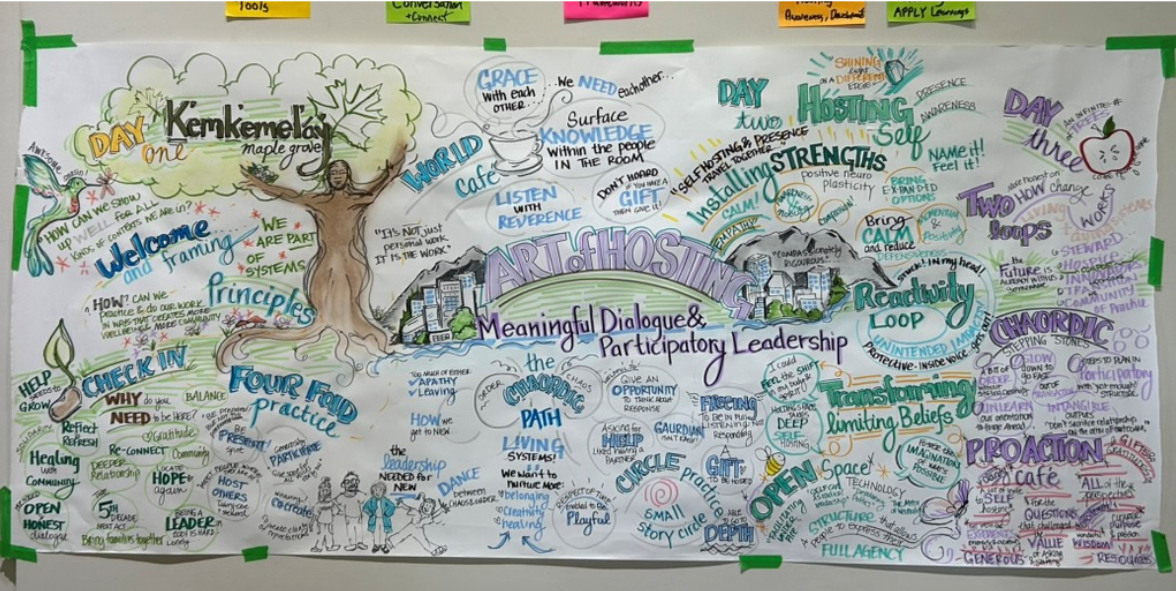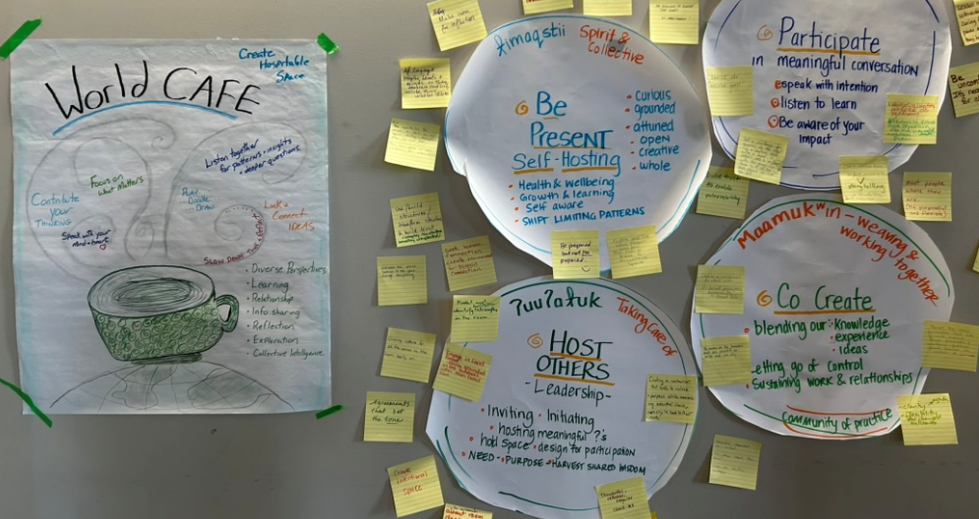Centre for Community Engagement and Social Change Year End Report 2024-2025
Introduction to the goal
Governance structures within research centres provide essential mechanisms for guiding good research practices. As a faculty-based centre aspiring for university status, we wanted to ensure the integrity of our processes and practices, while also being mindful of standards for operating. Hence, in our early CCESC collaborations, we focused on scanning the landscape of other Canadian Centers, connecting with established centres for community engagement and using this information to propel the operations and governance models. Additionally, we used a collaborative process to identify a Community Advisory Board and begin mapping project partners connected to the multifaceted efforts of the CCESC. A major focus for operations was focused on advancement activities. Each of the areas mentioned is described with next steps related to operations and governance.

Bringing the goal to life
Emerging Leadership and Governance Structure
A large focus of the CCESC efforts entailed establishing and refining the leadership and governance structure. The original model and the most recent revised model are both described and presented to show change in the Centre leadership over time.

The initial governance structure of the CCESC was based on data generated at the two Faculty of Education events held in February and November 2022.
In 2024, a new leadership structure evolved with three interconnected layers as the foundation for governance and operation. The working team, made up of staff and students manages day-to-day operations and implements the centre's initiatives.
The Executive Committee, led by the Director and Associate Director, relies on input from their own expertise to shape CCESC's strategic and financial vision. The Community Advisory Group will soon be launched (May 2025), including members from Queen's, Kingston, and the wider community.

Attending the Art of Hosting Training
In May 2024, CCESC Co-Chairs attended a multiday leadership training entitled, The Art of Hosting. This participatory leadership approach uses dialogue, facilitation, and co-creation to address complex challenges and foster human flourishing in organizations and communities. This training offers tools and practices to lead inclusive, engaging processes, build thriving organizations, and drive meaningful systemic change. They were able to connect with like-minded innovators while exploring methods like participatory dialogue, equity-focused leadership, and navigating complex challenges. This was the beginning of promising relationships.

Visiting and Exploring Canadian Centres Focused on Community Engagement
In May 2024, CCESC leaders, Drs. Patty Douglas and Michelle Searle visited three university Centers focusing on community engagement: The Community University Partnership (CUP), Simon Fraser’s Community Engaged Research Institute, and University of British Colombia’s Community Engagement Office. Each of these Centres offered different insights and perspectives about governance structures, integration of community, and opportunities for students, staff, and faculty. They asked about how the centres were established, how they changed over time, hurdles they have overcome, advice for funding, and supports that lead to success. These in-person experiences were later coupled when CCESC leaders Drs. Coopers and Searle, as part of the Queen’s University Principal’s Advisory on Community Engagement, worked with Research Assistants Jennifer Thompson, Katrina Carbone, and Francois-Daniel Portelance to conduct a rapid review of the top 20 Centres for community engagement in Canada. Findings from this review form the basis of a publication-in-progress about the current practices, innovative strategies, and successful models that can inspire the CCESC.


Funding and Advancement
As part of enhancing CCESC outreach and increasing our ability to support greater and larger research initiatives, CCESC has applied for a variety of funding opportunities. Two types of grants are being pursued: project (for research) and operational (for infrastructure and staffing).
We have identified and applied for grants which will flow funding into the Centre. CCESC Director Patty Douglas was recently awarded a 3-year SSHRC Partnership Development Grant ($199,619) to co-design autism services with autistic youth in Northern Ontario and Indigenous communities where culturally safe services are urgently needed. We have also recently applied for a Kingston Community Foundation grant to support our Artist-in-Residence Program ($25,000, pending) and have additional grants planned for the 2025-26 year.
Future directions for Goal 1
Working collaboratively, the Executive Committee and Community Advisory Board will continue to provide strategic and financial direction for CCESC as we work to develop new funding and advancement opportunities for community-engaged research. Some of the specific plans we have to continue to progress in this goal are:
- Expanding and sharing knowledge from CCESC visits and Principal’s Advisory rapid review to continue building on what is known about community-engaged education centres.
- Attending to granting announcements and securing financial support is an ongoing effort at the CCESC. Two key areas are related: First, obtaining funding announcements and continuing to seek diverse sources of funding to support CCESC efforts. Secondly, framing opportunities for providing support for CE research, funding and ethics submissions through intentional collaborations with faculty and university decision makers.
I know the Centre is a success when/if…..
- Communication is strong
- We are creating a meaningful place for community building
Note: The examples above represent an amalgamation of feedback from faculty and CERC members from collaborative events
Future Directions: Community Advisory Board
The Community Advisory Board (CAB) is an advisory body established and chaired by the CCESC Director, Dr. Patty Douglas, to provide strategic guidance, cultivate community collaborations, and ensure that the Centre and its research and scholarly efforts remain responsive to the priorities and needs of Queen’s University, the broader Kingston community, and beyond. The vision for the CAB is grounded in principles of equity, reciprocity, and community engagement, recognizing the ongoing impacts of systemic inequities in education and committing to centreing the voices, experiences, and knowledge of those most affected by these systems. The CAB will strive to create a space that honours diverse ways of knowing and being, and that cultivates reciprocal relationships between the university and the communities it serves.
More specifically, the CAB will:
- Provide strategic guidance and insight on community engaged initiatives.
- Offer feedback on programming, partnerships, outreach and advancement efforts.
- Strengthen relationships between the university and community organizations.
- Identify emerging needs, challenges, and opportunities for collaboration.
- Support knowledge mobilization and community-driven research initiatives.
We are excited to host the first meeting of the Inaugural Community Advisory Board on May 28, 2025, where we will collaboratively revise a Draft Terms of Reference and set strategic goals and priorities for our work together over the coming years.
We are excited to be welcoming our inaugural Community Advisory Board members, including:
- Hill Werth, Community Youth Representative
- Dr. Alana Bulter, Queen’s University
- Dr. Kelly Maracle, Queen’s University
- Dr. Nicole Bobbette, Queen’s University
- Dr. Wendy Craig, Special Advisor to the Principal, Queen’s University
- Dr. Erin Clow, Director of Experiential Learning, Loyalist College
- Dr. Scott Compeau, Associate Director Innovation and Education, Boys and Girls Club
- Michael Blackburn, Principal, Educational Services LDSB
- Helen Simson, President, Kingston Learning Disabilities Association
- Student Representative (to be filled Fall 2025)